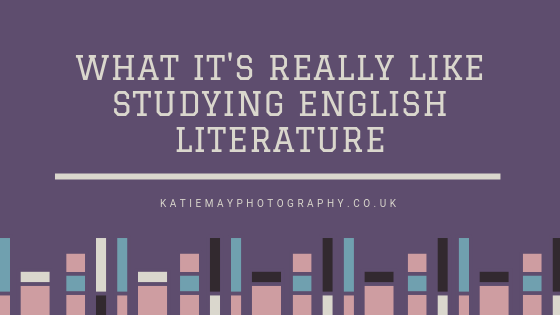I’m in my third, and final year, at University now, which I think makes me a good candidate for spilling the dirt on what being an English Literature student is really like! From how much reading the degree actually consists of, to what essays and exams are really like I’m the girl who’s about to tell you it all!

How Much Reading does English Lit Require?
This is possibly the main question on every prospective Literature student’s lips! Although I can only speak with authority on my own experience at Cardiff University, I assume that other UK universities will be similar.
The first thing to know about the reading load on a literature course is that it can vary greatly from module to module, for example, a module on 18th-century novels is going to have far more reading than one that focuses on modern poetry. Perhaps obviously, this is because a novel has far more words on average than a poem, or even multiple poems added together.
At Cardiff, each week of a module focuses on something different, in total we have ten weeks, so in a module that is novel focused this means a new novel every single week. Bear in mind this is for one module alone, at Cardiff we take three modules a semester
so if you take three novel based modules this is equivalent to three novels a week. Now that is a lot of reading! I personally try and choose my modules wisely, picking poetry modules that require less reading to balance out the heaviness of novel modules. I would highly recommend doing this when you’re allowed to pick your optional modules!
What Types of Books do you Read for an English Lit Degree?
After realising how much reading an English Literature degree consists of, you may be wondering what types of things you’re going to be spending all this time on! Personally, my first year focused on more classic texts: Romeo and Juliet, Jane Eyre, Pride and Prejudice, Huckleberry Finn etc. What I would define as stereotypical texts that all literature students ‘should’ read. However, my second year focused on far more modern books, I took modules that included books such as Bridget Jones’s Diary, Not That Kind of Girl by Lena Dunham, and even Mean Girls (yes, the film)! I also took a modern poetry module that focused on the likes of Ginsberg, Ted Hughes, and Virginia Woolf. Admittedly, my other module last year was Romantic Poetry so again was more classic in terms of content.
So it really comes down to the modules you personally choose to take as to what texts you end up reading!
What are Literature Assessments like?
When it comes to assessments there are two types, kind of like at A Levels, you have exams and essays. Where university assessments differ from school assessments however is that when it comes to essays there are two types: formative and summative. Formative essays are basically practice essays that you receive feedback on, but no grade. Summative essays are the ones that actually count toward your overall grade, so you want to make sure you take time on these (you’re usually given the questions at the beginning of term so you have plenty of time)! Essays also require you to do wider reading, and to include this in your work.
Exams are very similar to at school, you’ll be given a room to show up to (usually a sports hall) at a particular time and this is where you’ll sit your exam. Most of the time there will not only be your coursemates in this exam but people from other courses taking completely different exams.
The most different aspect of assessments is how the grading works. Anything above 40% is a pass, 40-50% is a third, 50-60% is a 2:2, 60-70% is a 2:1 and 70-100% is a first. Most employers are looking for graduates with a 2:1 or above so this is where you ideally want your marks to sit.
Overall
Whilst being an English Literature student can sometimes be hard, I mean there’s never technically a right or wrong answer so it can be tricky to navigate and there is a lot of reading, I’m definitely glad I chose to take it at university as I really enjoy the course!
I hope this post helps you understand a little more of what it’s like to be an English Literature student! If you have any questions, don’t hesitate to ask them in the comments or over on my Twitter or Instagram!
Love

